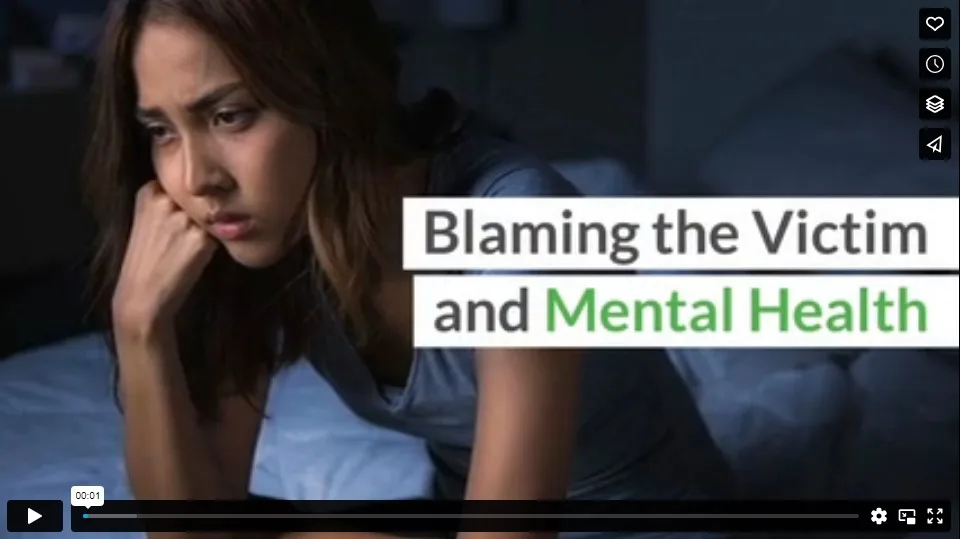As a society, we do not like to be out of control. Being the land of the free has instilled in us the idea that we are in control of our lives. We possess the power to choose our destiny. Hearing a story of victimization or admitting that you are a victim threatens that illusion of control. To avoid these feelings, victim-blaming has become a debilitating cultural phenomenon.
What Is Victim-Blaming?
Victim-blaming holds victims responsible for the acts perpetrated against them. It can be as subtle as wondering what the victim could have done differently to avoid what happened to them, and it can go as far as refusing assistance to victims seeking help.
Psychiatrists categorize victim-blaming as a secondary assault or trauma, contributing to depression, anxiety, and post-traumatic stress disorder (PTSD). It reinforces the messages abusers send their victims and can increase victims’ feelings of shame: the internalization of the mental and emotional injury they endured. Shame can distance the victim from their feelings and emotions.
Blaming the victim also reduces the likelihood of reporting future abuse due to the negative backlash or fear their story is not believable.
How can we support the unfortunate victims of the hurtful words or actions of others? It begins with changing the way we treat the situation and the victim.
Be Aware
Placing blame on the victim reduces the chances they will seek help due to their fear of being shamed or judged further. The first step to improving these odds is awareness.
Survivors benefit from supporters who understand the hazards of victim-blaming. It is crucial to recognize the tendency to rationalize suffering and trauma and realize that bad things can happen to good people. By accepting this fact, you acknowledge the victim’s vulnerability and courage to come forward and share their story.
Try Not to Question
Avoid accusatory questioning such as:
- What were you wearing?
- Were you drinking?
- What did you do that made him so upset?
The questions implicitly excuse the perpetrator and their actions. Questions that start with ‘why’ are naturally more likely to be interpreted by the victim as blaming them. It is human nature to look back on an event and figure out what you would change for a different outcome, but it is more harmful to the victim. It implicitly perpetuates the blame culture.
Validate The Victim
Children especially tend to blame themselves for what happened to them, but adults are prone to do this as well. Abusers are frequently someone in or close to the victim’s family, so common reactions from the victim’s loved ones are to refuse to believe the story or to try and quiet the story.
It requires a lot of bravery to speak up. Thus, it is essential to accept the facts without question when a loved one entrusts you with their story. Try to resist jumping into action. Let them tell their trauma narrative. Reassuring victims that this was not their fault also supports their efforts to talk openly and process their anger and grief.
Getting Assistance
Victim-blaming can cause increases in suicidal thoughts. If you see signs that your loved one or friend may be suicidal, it is vital to stand up for them and seek help. Treatment options such as therapy, medication, and transcranial magnetic stimulation treatment will help them process the emotional aftermath of trauma.
Finding a therapist or other mental health provider is a highly personal journey, and it may take some time to interview multiple therapists. It is crucial to involve the victim in the process of deciding how to address their symptoms. The chosen therapist should have experience dealing with the specific mental health issues arising from the abuse: anxiety, depression, PTSD, or a combination of symptoms.
Combatting Victim-Blaming Culture
Because victim-blaming is so entrenched in our culture, people may not realize the bias inherent in their statements and questions directed towards the victim.
Challenge and counter fault-based messages when you hear them. Do the same for any jokes. While some use humor to deal with traumatic events, it can normalize victim-blaming.
Hold abusers and their enablers accountable for their actions. Do not allow others to minimize the crime or blame the victim for their actions. Partner with organizations that teach the importance of supporting survivors to have the most impact in your community.
Victim-blaming is pervasive and contributes to negative social reactions to victims’ stories. Victims endure skepticism, anger, and implicit or explicit blame that can lead to mental health issues resulting in self-harm or suicide.
Taking the simple step to affirm the victim’s story and feelings will allow them to process and accept their feelings. By acknowledging that we are not always in control and could become victims, we will be more compassionate to ourselves and others when dealing with suffering.
Video

